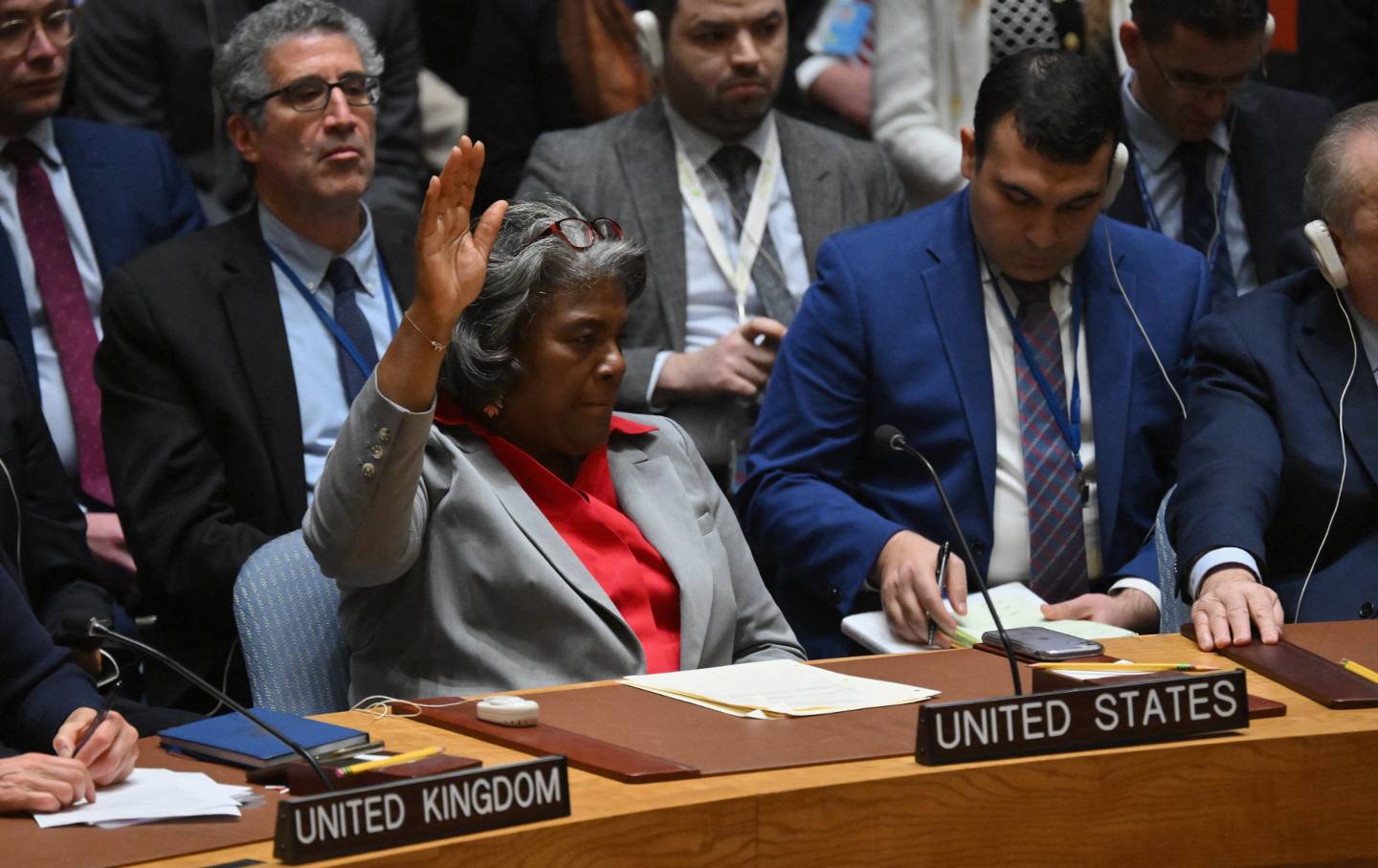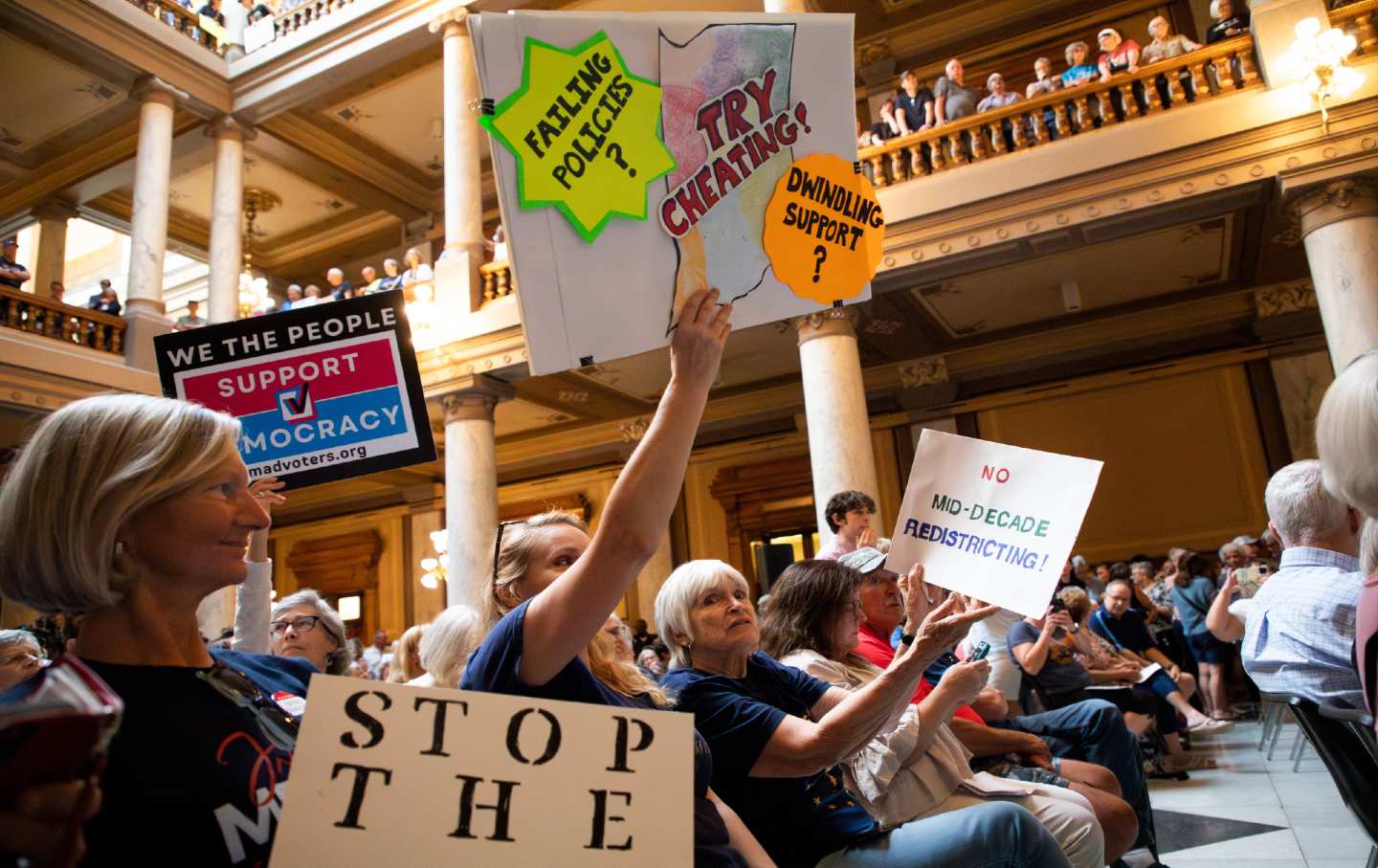Don’t Believe the Hype—Biden’s Israel Policy Hasn’t Changed
The decision to let a UN cease-fire resolution pass has been hailed as a dramatic turning point. It isn’t.

US Ambassador to the United Nations Linda Thomas-Greenfield votes “abstain” during a vote on a resolution calling for an immediate cease-fire in Gaza on March 25, 2024.
(Angela Weiss / AFP via Getty Images)On Monday, the United Nations Security Council voted to demand an immediate cease-fire in Gaza for the rest of Ramadan.
The resolution, which was backed by 14 countries after US-led efforts to water it down, combined the call for a cease-fire with a demand for the immediate, unconditional release of all hostages. (Given that it is tied to Ramadan, any cease-fire that comes from this resolution would last only a little over two weeks.) For the first time since the war in Gaza broke out, the United States abstained rather than vetoing the resolution, allowing the measure to pass. In response, the Israeli government immediately threw a tantrum, condemning the resolution and canceling a planned meeting at the White House.
These events prompted many political observers to say that a new, dramatic rupture had opened up between the Biden administration and Israeli Prime Minister Benjamin Netanyahu. Democratic Party politicians and commentators also interpreted the UN vote and its aftermath as a positive development, indicative of the power of grassroots pressure or of a potential shift in the Biden administration’s Israel-Palestine policy—one that could usher in further tangible changes.
But look beneath the seemingly roiling surface, and the reality is that Monday’s vote changed very little about the US approach to the war. All that has changed is that Biden has been given a chance to more effectively obscure his government’s material support and facilitation of mass atrocities in Gaza.
The clearest proof of this came from the administration itself in the hours following the UN vote. After the adoption of the resolution, Linda Thomas-Greenfield, the US ambassador to the UN, insisted that the resolution is “non-binding,” while reiterating that the United States will continue to support Israel’s war until Hamas can “no longer threaten Israel” and can “no longer control Gaza.” (Legal experts have strongly rejected the idea that the resolution is not binding.)
National Security Council spokesperson John Kirby was also clear, telling reporters on Monday that the US abstention from the cease-fire vote did not represent a change in the administration’s stance toward its ally. “Nothing, nothing has changed about our policy. Nothing,” Kirby said. He’s right.
The Biden administration is still helping Israel to implement a novel and uniquely bloody version of the old regime-change playbook. As its advisers and allies have repeatedly explained, the US-Israeli “plan” for Gaza requires removing Hamas from power and demilitarizing the region, which would enable them to impose a “victor’s peace” version of a two-state solution on a population with no way to meaningfully affect the outcome. To reach its goal of regime change in Gaza, the US fully backs Israel’s aim to kill as many Palestinian militants as possible—a plan that cannot be achieved without erring on the side of killing military-age males, whether armed or not.
This explains why—despite months of redundant reports that Biden is growing frustrated with Netanyahu—the president has refused to use any of his unparalleled leverage to change Israeli behavior. The US has remained committed to arming Israel, even as Biden and Congress withhold funding to UNRWA, the UN agency that distributes most of the food, medicine, and aid to Gaza. This is a clear signal that the US will defy global calls to “truly flood” Gaza with aid and will support Israeli efforts to starve militants out of the tunnels, even if that means mass starvation of civilians in Gaza.
Biden is also well aware that Israel is deliberately targeting civilians, as The Washington Post recently confirmed. Yet he continues to violate US law to greenlight arms sales. Shortly after the UNSC vote on Monday, the State Department said that it had found no evidence that Israel is violating Biden’s recent national security memorandum requiring recipients of US weapons to comply with international law, including by not blocking humanitarian aid. By all appearances, this pattern will continue until Netanyahu has brutally completed his mission of killing as many potential militants as possible, which is almost certain to come to a horrific conclusion in Rafah.
As Biden officials and allies have laid out, US support for a demilitarized Palestinian state is just the next step in Biden’s broader strategy to ensure Israel’s long-term security while maintaining US dominance in the Middle East.
Top Biden administration officials are clear that a demilitarized Palestinian state is necessary to impose a two-state deal that can provide political cover for Gulf regimes to normalize relations with Israel, with an expanded security alliance between the United States and the Saudi and UAE regimes. As Daniel Mouton, formerly a senior adviser to Biden’s top Middle East hand Brett McGurk, recently explained, “Long-term security in the Middle East” requires “US security agreements” with Gulf regimes, all of which are dependent on whether the US can “shape Israeli actions” toward a “two-state solution.”
McGurk himself articulated in vivid detail his disturbing vision for what should happen when the ethnic cleansing campaign is over. As HuffPost first reported, McGurk’s idea is to have Saudi Arabia and the other wealthy Gulf countries build on the rubble of Gaza, and then have Biden travel to the region for “a victory tour,” where he claims credit for the Israel-Saudi deal as the solution to decades of implacable crisis in the Middle East.
One goal of the “Biden doctrine,” as New York Times columnist Thomas Friedman called it, is to achieve the “global legitimacy” necessary to “take on Iran in a more aggressive manner.” With Hamas out of the picture and a demilitarized Palestinian state under the influence of the Gulf regimes, the thinking goes, the US will have Arab cover in the region to be able to counter Iran—and the cheap drones they’re worried about—and then put all of its energy toward a confrontation with China.
In the meantime, the Biden administration needs to manage domestic frustrations. The White House is beginning to successfully muddle the politics, by appearing to break with the Israeli extreme-right government that it’s armed and protected diplomatically, directing the military to build a pier in Gaza to distribute humanitarian aid (instead of letting UNRWA do it), and now by standing back to let a weakened resolution pass through the UN Security Council.
As the general election season kicks into gear, Biden’s team knows that it must quell anger over his handling of Gaza, and manipulate the public into believing that any slight shifts in his rhetoric are driven by a genuine shift spurred by Netanyahu’s conduct in the war. We shouldn’t fall for it.
Disobey authoritarians, support The Nation
Over the past year you’ve read Nation writers like Elie Mystal, Kaveh Akbar, John Nichols, Joan Walsh, Bryce Covert, Dave Zirin, Jeet Heer, Michael T. Klare, Katha Pollitt, Amy Littlefield, Gregg Gonsalves, and Sasha Abramsky take on the Trump family’s corruption, set the record straight about Robert F. Kennedy Jr.’s catastrophic Make America Healthy Again movement, survey the fallout and human cost of the DOGE wrecking ball, anticipate the Supreme Court’s dangerous antidemocratic rulings, and amplify successful tactics of resistance on the streets and in Congress.
We publish these stories because when members of our communities are being abducted, household debt is climbing, and AI data centers are causing water and electricity shortages, we have a duty as journalists to do all we can to inform the public.
In 2026, our aim is to do more than ever before—but we need your support to make that happen.
Through December 31, a generous donor will match all donations up to $75,000. That means that your contribution will be doubled, dollar for dollar. If we hit the full match, we’ll be starting 2026 with $150,000 to invest in the stories that impact real people’s lives—the kinds of stories that billionaire-owned, corporate-backed outlets aren’t covering.
With your support, our team will publish major stories that the president and his allies won’t want you to read. We’ll cover the emerging military-tech industrial complex and matters of war, peace, and surveillance, as well as the affordability crisis, hunger, housing, healthcare, the environment, attacks on reproductive rights, and much more. At the same time, we’ll imagine alternatives to Trumpian rule and uplift efforts to create a better world, here and now.
While your gift has twice the impact, I’m asking you to support The Nation with a donation today. You’ll empower the journalists, editors, and fact-checkers best equipped to hold this authoritarian administration to account.
I hope you won’t miss this moment—donate to The Nation today.
Onward,
Katrina vanden Heuvel
Editor and publisher, The Nation








